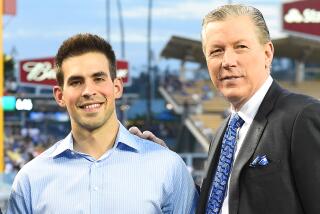Cosell’s Message Lost in Himself
- Share via
Howard Cosell was an eloquent, arrogant, educated, complicated, obstinate, obstreperous, vindictive, vituperative septuagenarian who died Sunday. Words fail me.
He was a great man, if he said so himself. Howard was part of our television upbringing, as much as Howdy Doody or Edward R. Murrow or Ed Sullivan or Mary Tyler Moore, with an unforgettably snooty voice full of righteous indignation and bombast. Bordering on self-parody by the end, it became impossible to tell the real Howard Cosell from Rich Little doing Howard Cosell.
He was a know-it-all and a tell-it-all.
But it was what separated him from every other cookie that came out of sports broadcasting’s cutter.
I remember Howard in so many permutations: Playing himself, for example, in any number of Woody Allen films, calling the play-by-play at a Third World junta’s presidential assassination (“Well, you’ve heard it with your own eyes!”) and later at a romantic couple’s wedding night. Or becoming host of his own, Sullivanesque television variety show, introducing a band of tone-deaf bubble-gummers who called themselves the Bay City Rollers with all the promotional verve of a man presenting Elvis or the Beatles.
How well I still recall Howard the raconteur, harking back to a wake held one afternoon in a Bel-Air garden for his longtime acquaintance Carroll Rosenbloom, for whom Howard delivered an extemporaneous eulogy. He quoted from Lord Byron and waited for the Ram owner’s widow, Georgia, to make an appearance, which she eventually did, 55 minutes after the ceremony began.
Howard always could spin a yarn.
Yet before his own death, it had been Rosenbloom himself who spoke publicly of Cosell as an egomaniac who thought of himself as professional football’s high priest and conscience. And it was Pulitzer Prize-winning author David Halberstam who referred to Cosell as a monster and a bully. And it was the genteel wordsmith Red Smith who, when asked by Cosell how many truly great broadcasters there were, deflated him memorably with: “One fewer than you think, Howard.”
The man affected people in many and sundry ways. The cranky Yankee owner, George Steinbrenner, recognizing an outspoken kinsman when he saw one, did a blurb for one of Cosell’s books citing his belief that “no one has had a greater impact on . . . television sports journalism,” as did Bill Cosby, who lionized Howard as “a man who is in search of the truth and wants to let us in on it.”
Cosell’s truth, alas, was often the kind that his own eyes beheld, unpopular and blunt. He ridiculed sidekick Frank Gifford as “a Teflon man” arrogant about himself as a performer and unwilling to acknowledge or correct his mistakes. Don Meredith came next--”Texas cruel,” Cosell called him, typical of a bias toward others that Howard would never have tolerated about himself--and before long, Faultless Frank and Dandy Don began to ascribe new adjectives of their own to Humble Howard.
Offending people came easily to him.
The first time sports journalist Lesley Visser ever met him, one winter’s day, Cosell looked her up and down and his opening line was: “Let’s have a look. Open your coat.”
“Fine. Take off your rug,” she countered.
Howard spun in his chair and turned his back to her.
The punch line in one of Woody Allen’s other scenes was that, come the future, criminals who commit dastardly acts will face punishment in the cruelest extreme--being forced to watch hours of Howard Cosell on TV. Those of us who did exactly that, for the better part of two decades, might gladly choose electrocution or the gas chamber instead.
And yet, everything that made Cosell insufferable and self-aggrandizing also formed the immortality of his character. Any admiration one felt for Cosell’s steadfast support of Muhammad Ali was tempered by the constant accompaniment of Howard telling us that he--and he alone, to hear him tell it--was the champion’s greatest champion. Cosell truly believed it was he who personally made the Greatest so great.
Alluding to football great Jim Brown, Cosell once told Ali: “I helped make him. But I made you.”
All his life, Howard was so full of Howard.
But he evoked a response in people, unlike that usually seen or heard. Patrons of saloons on Monday nights put money into pools for the right to hurl bricks at portable TVs, the instant Howard’s face appeared on screen. He was a one-man dunking booth, for whom millions would have stood in line. Smug but harmless, Cosell never merely broadcast to audiences; he lectured them.
Upon learning of his old ally’s death, Ali saluted the old showman and said that he hoped to meet Howard again in the hereafter. Howard will be there waiting, telling Allah how he helped to create Ali, and possibly vice versa. No man ever talked as good a game as Howard Cosell.
* COSELL DIES: Related story, A1
More to Read
The complete guide to home viewing
Get Screen Gab for everything about the TV shows and streaming movies everyone’s talking about.
You may occasionally receive promotional content from the Los Angeles Times.






